To the southeast of Xining and about 160km away from it, Tongren is a small county within Huangnan Tibetan Autonomous Prefecture in Qinghai, China, with an average altitude of about 2500m. It is adjacent to Xiahe County of Gansu Province in the East and Guide County of Qinghai Province in the west. It has 3 towns, 8 townships, 72 administrative villages, and 6 communities with a total population of 94000, covering an area of about 3465 square kilometers, and most residents there are Tibetans.
It is known for its Regong Arts and the Tibetan Buddhist Temples such as Rongwo Temple. As the birthplace of Thangka Paintings and Thangka Embroidery, Tongren is praised as "the hometown of Regong Art". Its slow-paced lifestyle, ancient temples, beautiful villages, and exquisite Thangka paintings attract many visitors to come every year.
Tongren is the only national historical and cultural county in Qinghai Province, the birthplace of Tibetan Regong culture. Besides experiencing the drawing process of Thangka and appreciating the colorful Regong Arts, you can visit Tongren's main tourist attractions including Rongwo temple, Wutun temples, Nianduhu temple, etc; There are over 30 intangible cultural heritages above the county level, and 41 cultural relics protection sites. Check the best must-visits to plan your Tongren itinerary.
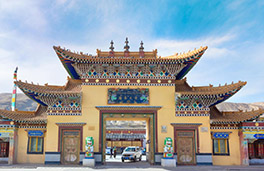
Rongwo temple is the most famous temple in Tongren. It is a Gelukpa temple. In the Amdo area, its influence is second only to Ta'er temple and Labrang temple. It is resplendent and beautiful. There are many murals, embroidery, Thangka, and other works of art.
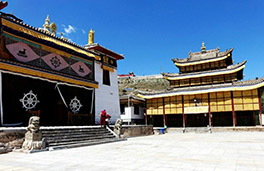
Nianduhu temple is also a part of Rongwo temple area. Its scale is small. There are only two main halls, not many monk rooms, and few tourists. There are very exquisite murals in the temple, which are very stunning and precious in domestic Tibetan temples.
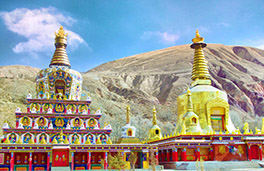
There are two villages, Wutun upper and Wutun lower, with Wutun upper and Wutun lower temples respectively. Many Regong works of art are preserved here, which can be a museum of Regong Buddhist art with many folk artists living in the villages.
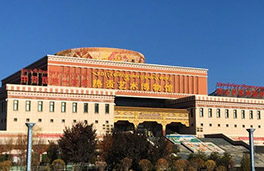
There are three floors in the Museum, which mainly shows the historical development of Regong Art, the life of artists and the artworks, researches of Regong Art. There are five exhibition halls about Thangka, sculpture, embroidery, sand art, cultural relics.
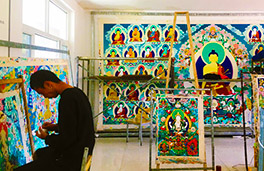
It is the Regong Art Learning Institute. The second floor is the art exhibition room. It mainly displays Thangka, embroidery, wood carving, and other works of art with Tibetan Buddhism as the theme. On the third floor is the creation room, where students are painting.
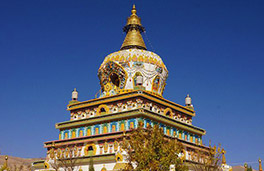
Not far from Wutun temple. It is the Tu village. The village is generally a closed circular structure with many cow dung walls. Passing through it, you will see a magnificent pagoda, which is the guomari Shilun pagoda. It is known as "the first tower of Amdo".
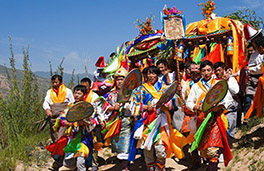
Every year from June 16 to 25 of the lunar calendar, the grand Shanman festival of Tu people is held among villages in Longwu Town, Baoan town and Nianduhu township, etc. There are many interesting rituals and dazzling colorful traditional costumes.
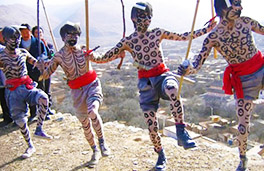
Every year from Nov 5 to 20 of the lunar calendar, Nianduhu village carries out the exorcism and pestilence of "Wutu Dance". Yutu is the name of the dancer painted tiger and leopard stripes and dots. The villagers believe the Wutu dance can drive away the disease.
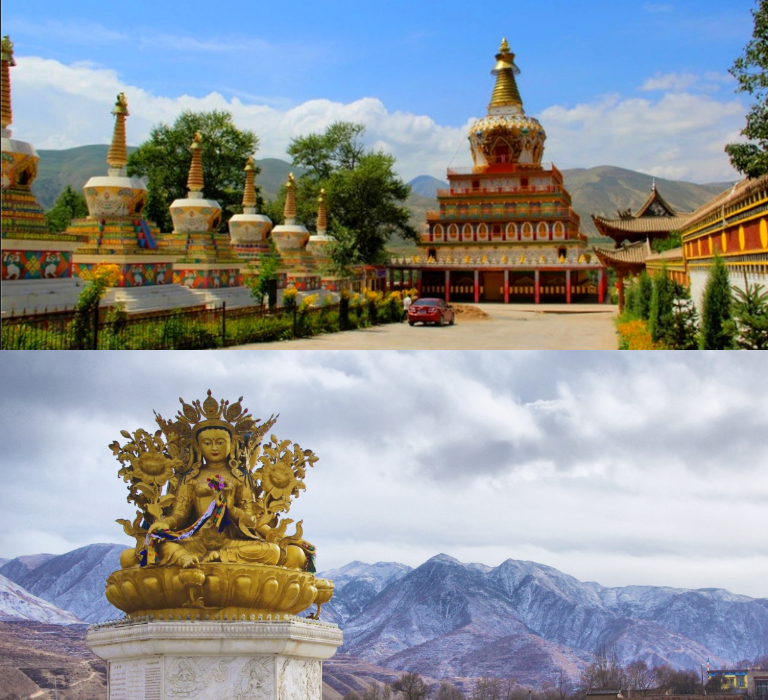
Due to the inland location and complicated terrain of the plateau basin and high mountains, Tongren has a Continental Plateau Climate. Its major characteristics are cold temperature and semi-arid climate, low precipitation, obvious vertical temperature change, significant regional difference, large daily temperature difference, sufficient sunlight, long and cold winter, and short, cool summer. The annual average temperature is 5.2°C, and the mean annual rainfall is 125mm.
Generally, the best time to visit Tongren is from May to September, especially in the summer months when most regions have mild temperatures and Shaman festival period in lunar June. Other times are too cold and windy.
Tips: Bring extra layers for temperature change and sunblock clothes, sunhat, sunglasses, sunscreen against strong ultra-violet radiation.
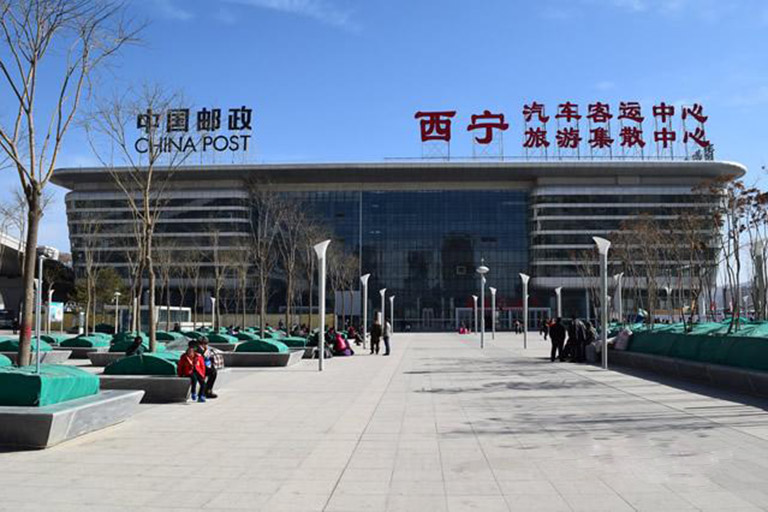
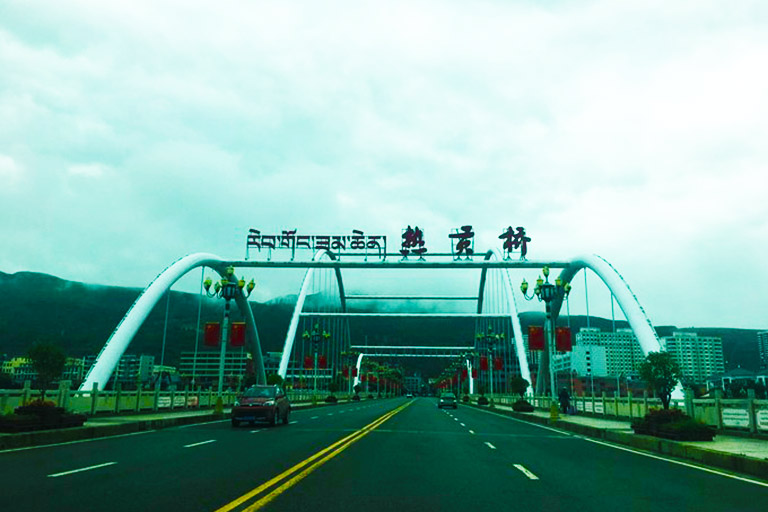

▶ Get to Tongren
Tongren has no airport or railway station. Generally speaking, from major cities to Tongren, you need to get to Xining first, the capital of Qinghai Province, and then drive or take the bus to Tongren; There are also buses between Xining and Xiahe passing by Tongren.
Useful Link: How to Get to Xining
Xining to Tongren: The driving distance from Xining to Tongren is about 160km (2.5-3 hours by car). Every day from 7:40 AM to 6:30 PM, there are many buses departing from Xining Bus Station to Tongren Bus Station with a duration of 2.5 hours and a ticket fare of CNY 40 per person.
• Xining Bus Station (西宁客运中心) Address: No.1 Jianguo Street, Chengdong District, Xining City西宁市城东区建国大街 1 号
• Tongren Bus Station (同仁汽车站) Address: Dongshan Road, Tongren County, Huangnan Prefecture, Qinghai Province青海黄南州同仁县东山路
Xiahe to Tongren: Xiahe is a Tibetan town centered around the huge Labrang Monastery. The ticket office is open from 8:30 am to 6:00 pm. There are few seasonal buses departing from Xiahe to Xining, passing Tongren.
▶ Get Around Tongren
In Tongren County, it's very convenient and cheap to take a taxi in the town. If you want to go to the surrounding villages, you need to negotiate with the driver. If you go from Tongren County to the nearby Guomari village and Wutun villages, they are not too far from the county. If you want to go further, you need to charter a car.
By Private Car - Top Recommended: Because Tongren is located in a remote region and main attractions are far away from each other, traveling with a private vehicle, a local guide is quite helpful. There are some local buses, but they are very inconvenient for travelers. To better acclimatize yourself to the altitude and get a better travel experience, it’s highly advised to get around Tongren by private car. Please feel free to contact us for transportation help.
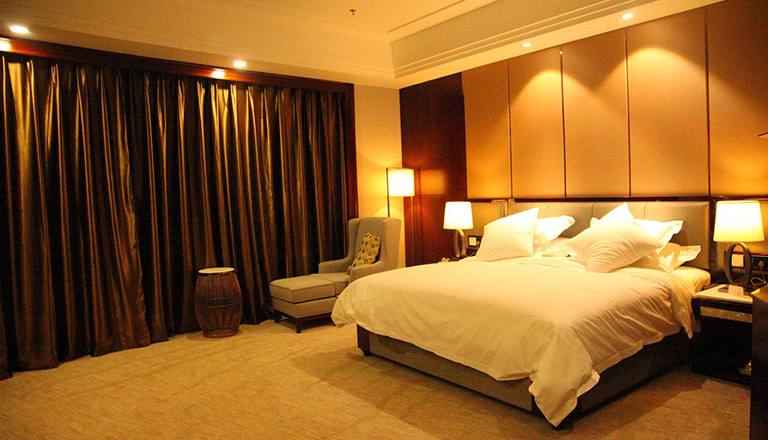
There are not many hotels in Tongren and most of the accommodations are midrange hotels and Tibetan homestays. The facilities and the equipments of the hotels are surely not good as these hotels in Xining, but most hotels can offer you a nice stay. If you would like to stay in a local homestay, you’d better have a local guide with you. The best accommodation area is around Zhongshan Rd, the downtown area of Tongren.
Recommend Hotels in Tongren: Shengyu Tianlun Hotel, Yunlong Hotel, HongFengDe Hotel, Xinshijia Business Hotel
Tongren maybe an unknown palace for many tourists. Here we made some travel maps of Tongren to help you know its location, major attractions to see. You can click to enlarge the maps to get more details for planning your trip. Moreover, these updated maps are free to download.
Located on Qinghai-Tibet Plateau, Qinghai Province not only creates tremendous natural wodners like crystal salt blue lakes, magnificent Yardan landforms, majestic mountains, vast grasslands and precious nature reserves, but also presents unique culture of diverse ethnic minorities.Besides Tongen, the following are four highly-praised destinations tourists love to visit with Xining. You can pick one or more for an in-depth exploration of the natural and cultural sepctacles of Qinghai.
Though far away from the eastern and central developed cities, northwestern China is a beloved dream land for tourists to trace back to the ancient Silk Road and discover less-tourist lanscape and experience the diverse minority culture. As one of the birthplace of many ancient Chinese civilizations, you can also find time-honored relics in this region. Here are four best places selected for you to enjoy the stunning plateau scenery, vast deserts and glorious culture and history, make a special, meaningful and memorable adventure. You can easily travel to these charming places from Xining. (Check all destinations in China.)
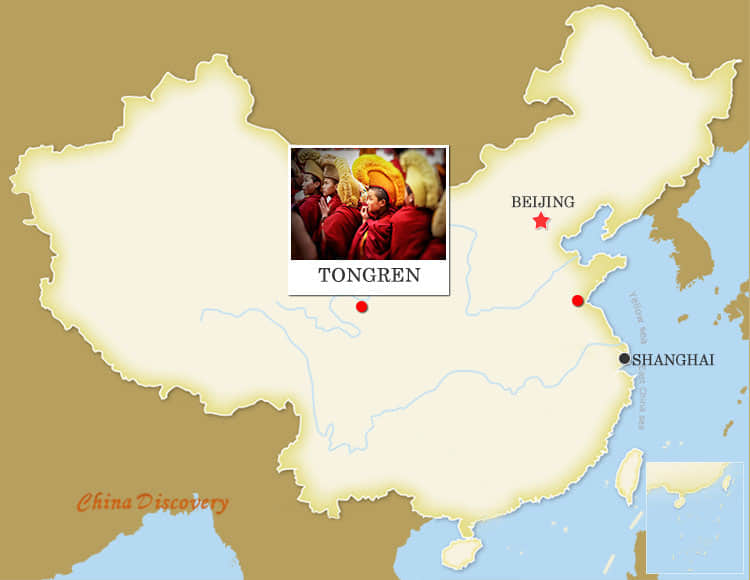
Chinese Name: 同仁
Chinese Pinyin: tóng rén
Area: 3465 Square Kilometers
Population: 94,000
Average Altitude: 2,500 meters
Language: Zhongyuan Mandarin, Tongren Dialect, Amdo Tibetan
Tel Code: 0973
Zip Code: 811399
Time Zone: (UTC+8)
Known for the Regong Art, Tongren has something really Tibetan and Artistic for you. Only about 2.5 hours' drive from Xining city, Tongren is usually visited after Xining. The most popular and classic itinerary is to spend 1 to 2 days visiting main attractions in & around Xining including Kumbum Monastery, Dongguan Mosque of Xining, and make a day trip to the beautiful Qinghai Lake and then drive a few hours to Tongren. After sightseeing, travelers can continue a journey to Gansu. Since Tongren is really close to Xiahe of Gansu Province. When in Xiahe, you can use 1 to 2 days to discover the holy Labrang Monastery and more days to visit Sangke Grassland, Bingling Temple, etc. For those who have more time to travel, it’s highly advised to extend the trip further to Zhangye, Dunhuang, Jiayuguan, and Xinjiang along the Silk Road.
The following are our most popular Qinghai tours covering the best highlights, you can choose from a favorite one according to your schedule and interest or contact us to customize a special one on your own.
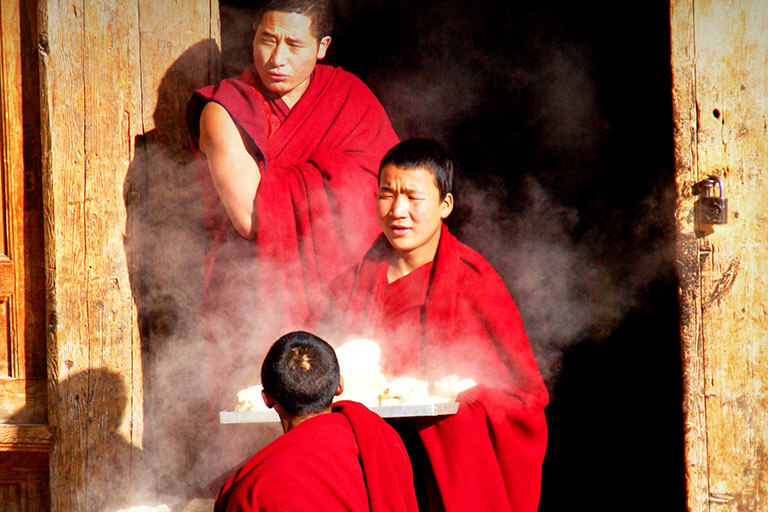
Xining / Qinghai Lake / Tongren / Xining
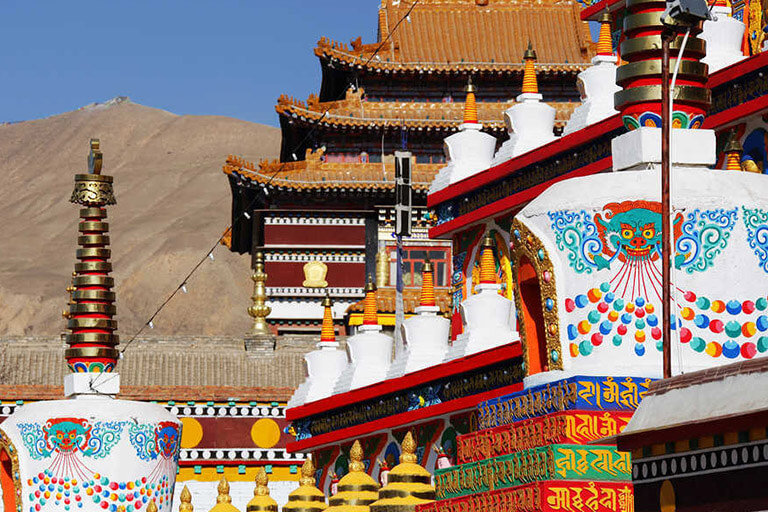
Xining - Tongren - Xiahe - Linxia
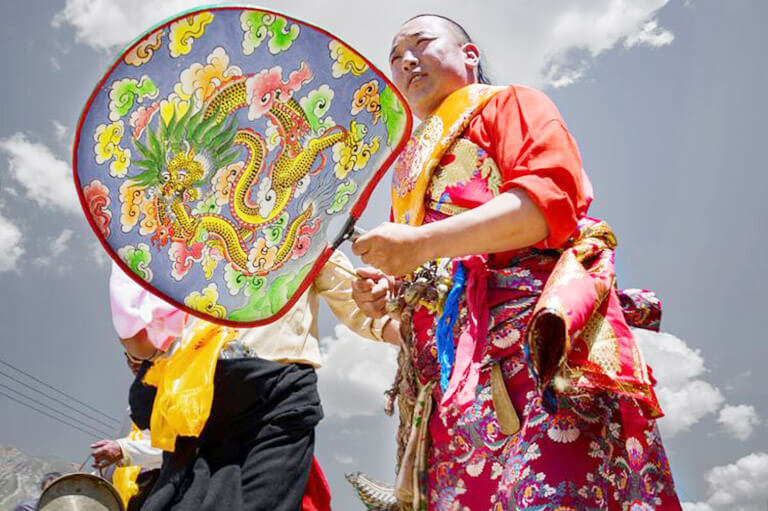
Xining / Qinghai Lake / Tongren / Xining
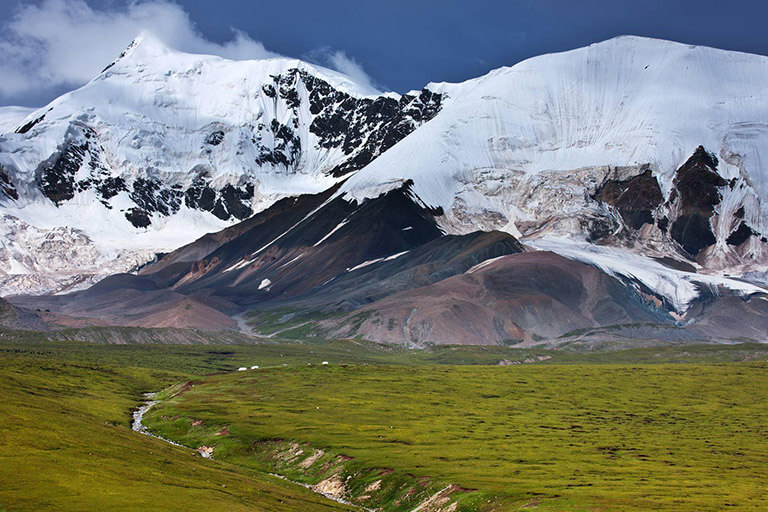
Xining / Kanbula National Forest Park / Tongren / Dawu / Amne Machin / Qinghai Lake / Xining
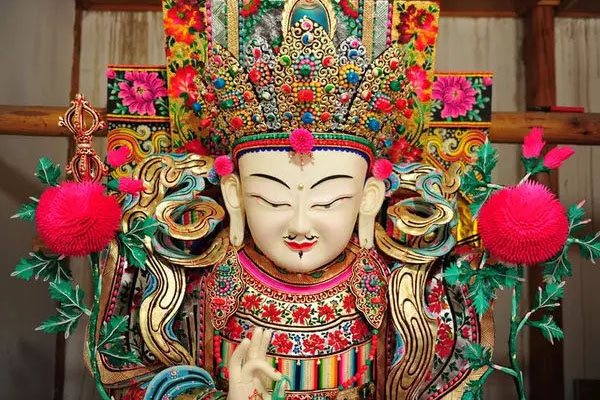
Xining - Tongren - Xiahe - Lanzhou - Zhangye - Jiayuguan - Dunhuang